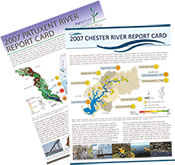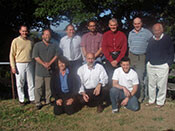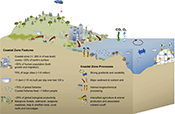Chester and Patuxent River Report cards released
 IAN and EcoCheck released the first ever Chester and Patuxent River report cards during April. These report cards are the result of a 12 month project aimed at showing how data collected by community groups and government departments can be combined into a product that engages and informs the local community. The project was supported by a grant from the Chesapeake Bay Trust. The Patuxent River estuary scored a 'D-' grade although grades ranged from 'C-' to 'F', depending on the location. Creeks flowing into the Chester River scored a 'C' grade, while the tidal region scored a 'D'. Additional partners in this project were the Maryland Department of Natural Resources, NOAA Chesapeake Bay Office, Waterkeeper Alliance and Gov4n6.
IAN and EcoCheck released the first ever Chester and Patuxent River report cards during April. These report cards are the result of a 12 month project aimed at showing how data collected by community groups and government departments can be combined into a product that engages and informs the local community. The project was supported by a grant from the Chesapeake Bay Trust. The Patuxent River estuary scored a 'D-' grade although grades ranged from 'C-' to 'F', depending on the location. Creeks flowing into the Chester River scored a 'C' grade, while the tidal region scored a 'D'. Additional partners in this project were the Maryland Department of Natural Resources, NOAA Chesapeake Bay Office, Waterkeeper Alliance and Gov4n6.
San Francisco Estuary report card scoping workshop
 A workshop sponsored by the National Center for Ecological Analysis and Synthesis was held at the Romberg Tiburon Center for Environmental Studies on the shores of San Francisco Bay. The scoping workshop was organized by Drs. Erica Fleishman (NCEAS), Wim Kimmerer (San Francisco State University) and Bill Dennison (IAN). Workshop participants developed a report card framework based on the pelagic organism decline in the San Francisco Estuary. The pelagic organism decline is a relatively recent (ca. 2000), precipitous reduction in the numbers of various species of estuarine fish (e.g., delta smelt, threadfin smelt, longfin smelt and striped bass). A suite of water quality parameters and habitat features relevant to the pelagic organism decline was developed to form the draft indicators for a San Francisco Estuary report card.
A workshop sponsored by the National Center for Ecological Analysis and Synthesis was held at the Romberg Tiburon Center for Environmental Studies on the shores of San Francisco Bay. The scoping workshop was organized by Drs. Erica Fleishman (NCEAS), Wim Kimmerer (San Francisco State University) and Bill Dennison (IAN). Workshop participants developed a report card framework based on the pelagic organism decline in the San Francisco Estuary. The pelagic organism decline is a relatively recent (ca. 2000), precipitous reduction in the numbers of various species of estuarine fish (e.g., delta smelt, threadfin smelt, longfin smelt and striped bass). A suite of water quality parameters and habitat features relevant to the pelagic organism decline was developed to form the draft indicators for a San Francisco Estuary report card.
Environmental problem solving in coastal ecosystems: A paradigm shift to sustainability
 This article, recently published in Estuarine Coastal and Shelf Science 77(2): 185-196, highlights pressures on coastal ecosystems and the need for a major paradigm shift directed at sustainability, and in a shift in scientific focus on solving rather than just studying our current environmental problems. Traditionally, science has been extremely effective at data acquisition and then successively less effective at translating this into information, knowledge and finally environmental problem solving. A key element in turning this process around is better science communication between scientists, key stakeholders and the community.
This article, recently published in Estuarine Coastal and Shelf Science 77(2): 185-196, highlights pressures on coastal ecosystems and the need for a major paradigm shift directed at sustainability, and in a shift in scientific focus on solving rather than just studying our current environmental problems. Traditionally, science has been extremely effective at data acquisition and then successively less effective at translating this into information, knowledge and finally environmental problem solving. A key element in turning this process around is better science communication between scientists, key stakeholders and the community.
Science Communication Courses held at Horn Point and Charleston, SC
 The Integration and Application Networks annual 'Effective Science Communication Course' was held from April 22-24 at the University of Maryland Center for Environmental Science's Horn Point Laboratory (HPL). Twelve students, staff and faculty from UMCES were joined by eight other participants from federal, state and private agencies, traveling from as far as Hawaii, Seattle and the Sonoran Desert. In addition to the annual HPL course, two additional courses were taught at the beginning of April in Charleston, South Carolina. A 1-day and a 2.5-day course were provided to over 20 NOAA Coastal Services Center and SC Department of Natural Resources staff. The courses provided an engaging opportunity to learn or further develop science communication skills. For future courses, please check the course website or email us to inquire about costs of a custom course.
The Integration and Application Networks annual 'Effective Science Communication Course' was held from April 22-24 at the University of Maryland Center for Environmental Science's Horn Point Laboratory (HPL). Twelve students, staff and faculty from UMCES were joined by eight other participants from federal, state and private agencies, traveling from as far as Hawaii, Seattle and the Sonoran Desert. In addition to the annual HPL course, two additional courses were taught at the beginning of April in Charleston, South Carolina. A 1-day and a 2.5-day course were provided to over 20 NOAA Coastal Services Center and SC Department of Natural Resources staff. The courses provided an engaging opportunity to learn or further develop science communication skills. For future courses, please check the course website or email us to inquire about costs of a custom course.

